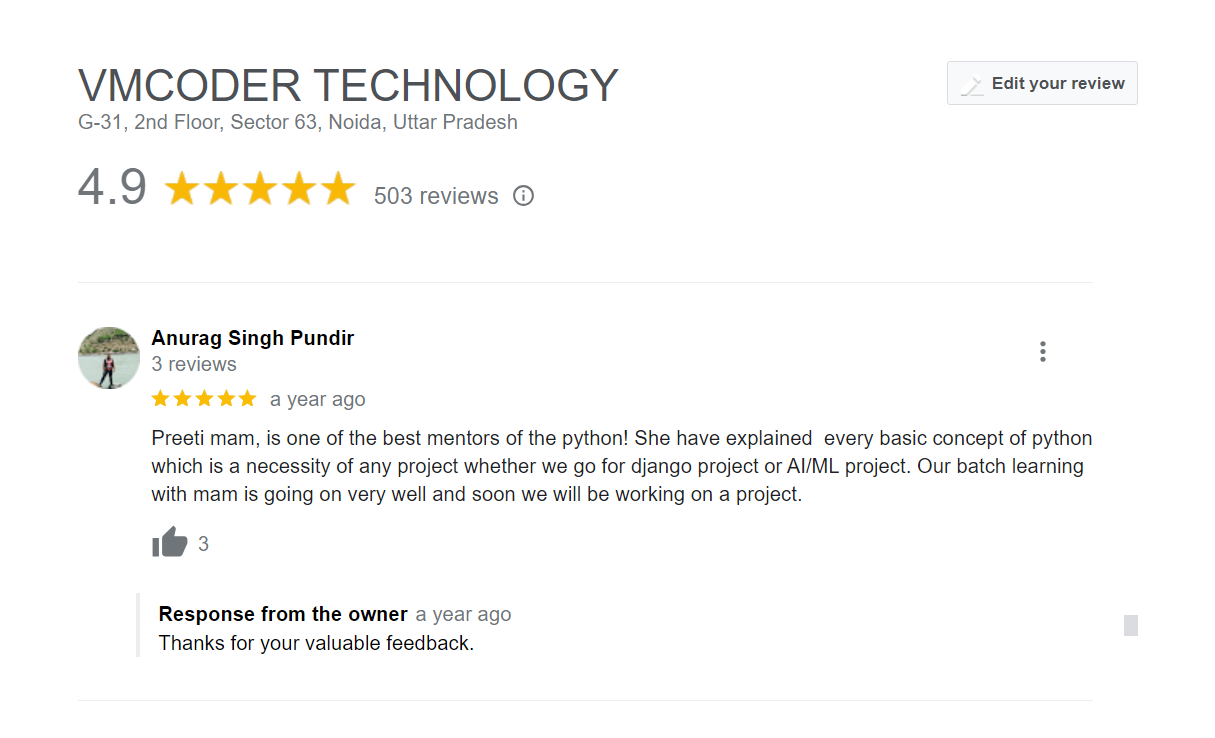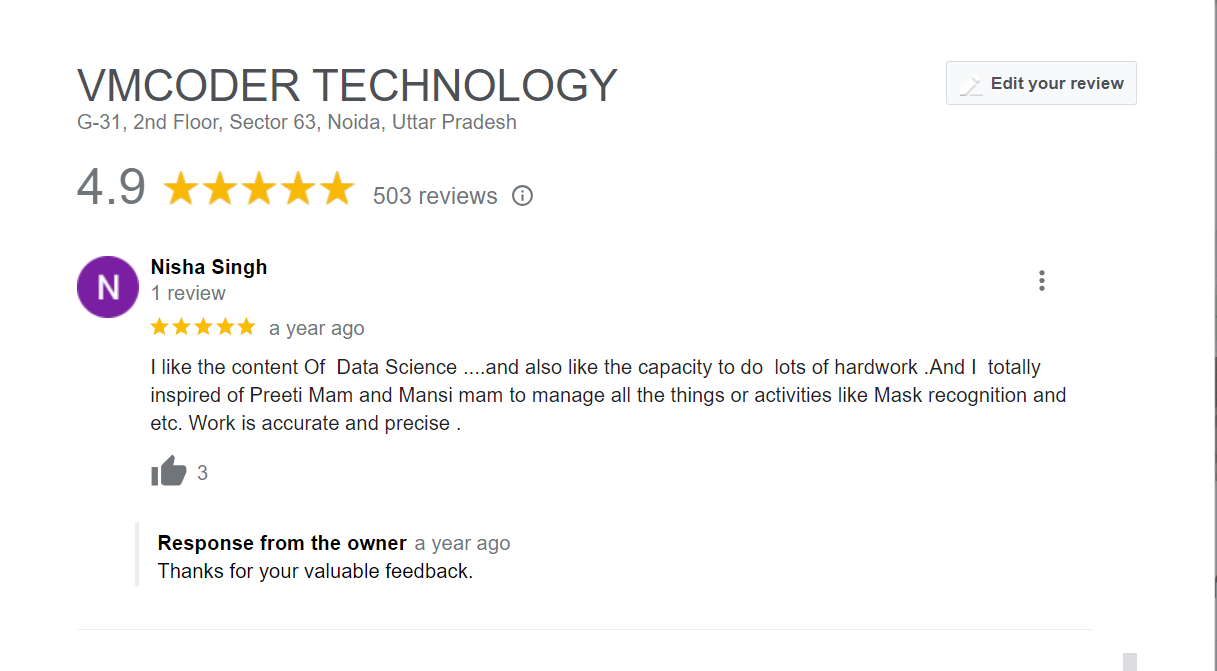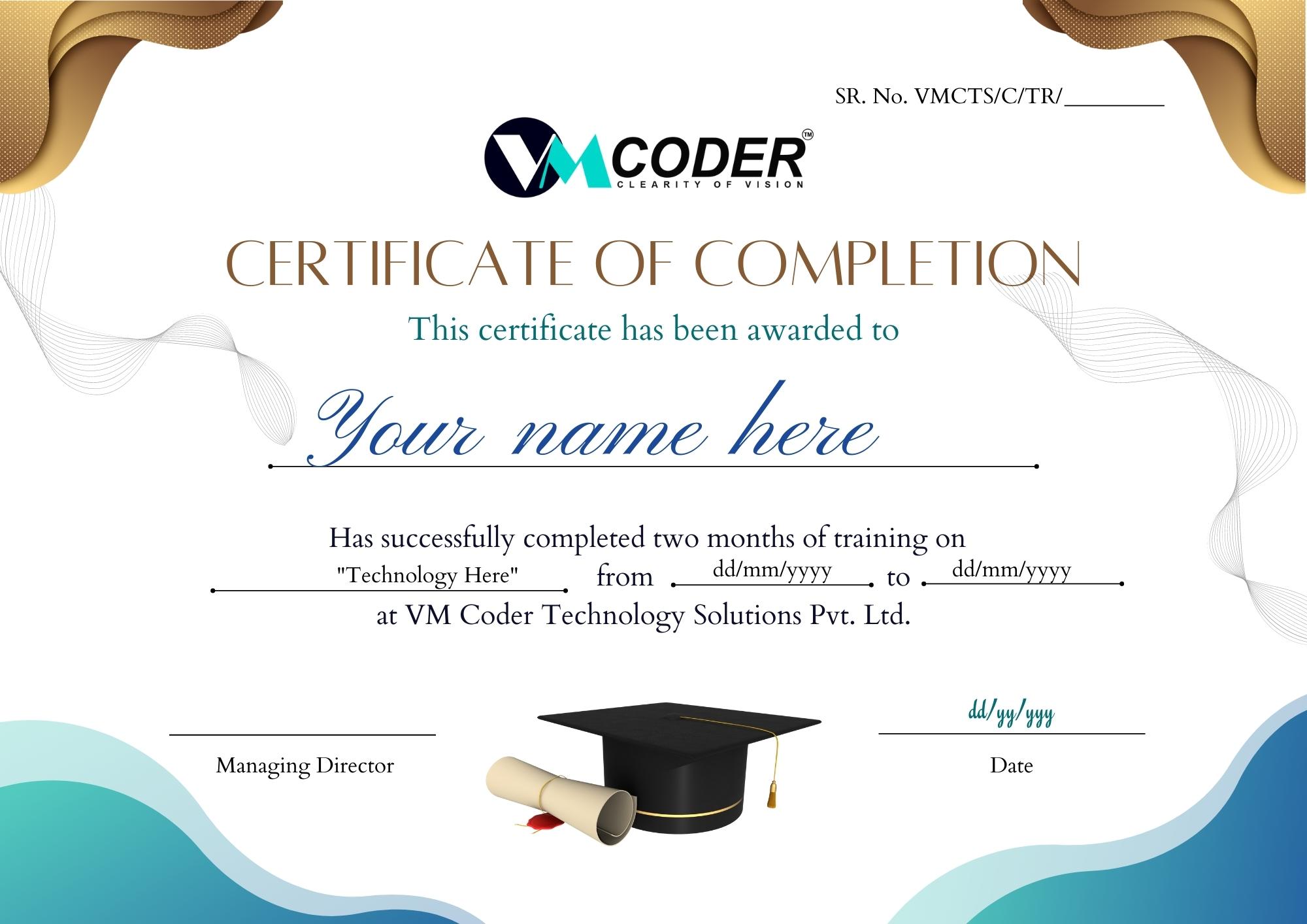Our Courses Overview
VM Coder is an IT training institute that offers data science certification training to students looking to enhance their skills and build a strong career in the field of data science. VM Coder provides comprehensive training programs that cover various aspects of data science, including statistical analysis, machine learning, data visualization, and data manipulation.
Here is an overview of how VM Coder provides data science certification training:
1. Course Curriculum: VM Coder designs its data science training courses to cover the fundamental concepts and advanced techniques in the field. The curriculum is developed by industry experts and is regularly updated to keep up with the latest trends and technologies in data science.
2. Experienced Instructors: VM Coder employs experienced instructors who have practical knowledge and expertise in data science. These instructors guide students through the course material, explain complex concepts, and provide real-world examples to help students understand the applications of data science in various industries.
3. Hands-on Projects: VM Coder emphasizes practical learning by providing hands-on projects that allow students to apply their knowledge to real-world scenarios. These projects help students gain practical experience and develop problem-solving skills.
4. Industry Case Studies: VM Coder incorporates industry case studies into the training program to give students a deeper understanding of how data science is applied in different domains. Analyzing real-life examples helps students connect theory with practical applications.
5. Flexible Learning Options: VM Coder offers flexible learning options to accommodate different student needs. Students can choose from online or in-person classes, full-time or part-time courses, and self-paced or instructor-led training.
6. Certification: VM Coder provides data science certification upon successful completion of the training program. This certification validates the skills and knowledge acquired by students during the training and enhances their credibility in the job market.
7. Career Support: VM Coder offers career support services to help students kickstart their data science careers. This includes resume building, interview preparation, and job placement assistance.
8. Community and Networking: VM Coder fosters a community of data science enthusiasts where students can interact, collaborate, and network with peers, instructors, and industry professionals. This helps students stay updated with the latest trends and opportunities in the field.
By providing a comprehensive curriculum, experienced instructors, practical projects, industry case studies, flexible learning options, certification, career support, and networking opportunities, VM Coder aims to equip students with the necessary skills and knowledge to excel in the field of data science and build a strong career.
Apply For Training
CURRICULUM & PROJECTS
- Introduction to Data Science
- Overview of data science
- Role of data scientists
- Applications of data science in various industries
- Mathematics and Statistics for Data Science
- Linear algebra
- Probability theory
- Statistical inference
- Multivariate calculus
- Programming and Tools
- Python programming language
- Data manipulation libraries (e.g., NumPy, pandas)
- Data visualization libraries (e.g., Matplotlib, Seaborn)
- Jupyter Notebook or other integrated development environments (IDEs)
- Data Cleaning and Preprocessing
- Handling missing data
- Outlier detection and treatment
- Data normalization and scaling
- Exploratory Data Analysis (EDA)
- Data visualization techniques
- Descriptive statistics
- Feature selection and engineering
- Machine Learning
- Supervised learning algorithms (e.g., linear regression, logistic regression, decision trees, random forests, support vector machines)
- Unsupervised learning algorithms (e.g., clustering, dimensionality reduction)
- Model evaluation and selection
- Hyperparameter tuning
- Deep Learning
- Neural networks and their architectures
- Convolutional Neural Networks (CNNs) for image data
- Recurrent Neural Networks (RNNs) for sequential data
- Transfer learning
- Introduction to frameworks like TensorFlow or PyTorch
- Big Data and Distributed Computing
- Hadoop and MapReduce
- Apache Spark for distributed data processing
- Handling large datasets
- Data Science in Practice
- Data acquisition and data sources
- Data ethics and privacy considerations
- Building end-to-end data science projects
- Deployment and productionizing models
- Capstone Project
- Applying data science techniques to solve a real-world problem
- Working on a complete data science project from start to finish
- Skill Development: Training programs provided by companies are designed to enhance specific skills required for the job. These programs can help individuals acquire new knowledge, improve existing skills, and stay updated with the latest industry trends.
- Career Advancement: Company-sponsored training often focuses on developing employees' competencies and preparing them for career growth opportunities. By participating in training programs, individuals can enhance their qualifications, increase their value to the company, and potentially open up new avenues for promotion or better job prospects.
- Increased Productivity: Well-structured training programs can improve employees' efficiency and effectiveness in their roles. By equipping individuals with the necessary knowledge and skills, companies can enhance overall productivity, leading to better performance and outcomes for both employees and the organization.
- Standardization and Quality Assurance: Training programs help establish standard procedures and best practices within an organization. By ensuring that employees are trained consistently, companies can maintain quality standards across different teams and departments, leading to better outcomes, customer satisfaction, and overall operational excellence.
- Personal Growth and Confidence: Training programs not only focus on professional skills but also contribute to personal growth. Employees gain confidence, expand their knowledge base, and develop a broader perspective through exposure to new ideas and experiences. This personal growth can have positive effects on both professional and personal aspects of their lives.
Training helps in to grow your career.
Google Reviews Of
VM Coder Technology









Effective Growth Strategies, Converting Websites & Online Marketing.
Obtain Your Accreditation
Showcase Your Accomplishments

Placement Support

Career Advisor

Mock Interviews

Coding Quiz








 VM Coder provides best training and they also prepare you for interview and now I am working as a Python developer in a IT company with a good salary package.
VM Coder provides best training and they also prepare you for interview and now I am working as a Python developer in a IT company with a good salary package.





